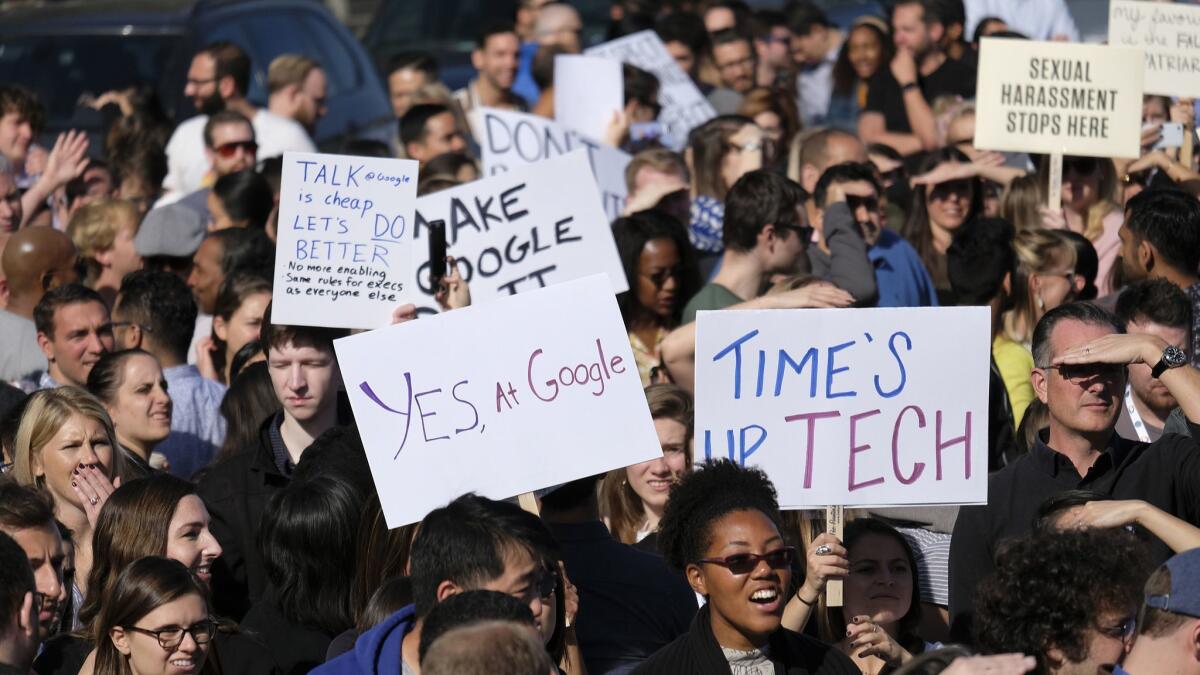Tech workers’ fight against forced arbitration gets a boost in Congress

- Share via
The technology industry isn’t known for its activist culture, but after years of relative silence some workers are beginning to challenge practices they consider unfair, such as mandatory arbitration.
A push is underway across the sector to end companies’ long-held practice of forcing staffers to take workplace disputes to arbitration instead of suing. Workers at Google persuaded the search giant to drop its requirement that employees waive their right to bring disputes against it to court, starting March 21.
The campaign has found some prominent backers, including Sen. Richard Blumenthal (D-Conn.) and Rep. Hank Johnson (D-Ga.), who on Thursday introduced legislation that would end mandatory arbitration clauses nationwide.
“We’re not willing to wait for corporate America to do the right thing,” Blumenthal told reporters Thursday. “This kind of injustice has to end for the sake of everyone in the workplace, men and women.”
Mandatory arbitration, some workers contend, undercuts one of the few means of recourse in cases of company misconduct by forcing secret deliberations.
Some tech companies have begun to alter their policies as they face more forceful objections from staff.
Google is unusual in that it is doing away with forced arbitration for employees under all circumstances. Last year, Microsoft Corp., Uber, Lyft and Facebook Inc. announced that they would let employees with sexual misconduct complaints pursue their cases in court. But for disputes on other topics, those companies’ bans on lawsuits remain.
An Uber spokesman acknowledged that it was just a first step but said arbitration plays an important role in the justice system.
“We watched as some companies tried to create policies in a surgical fashion, carving only a narrow category of cases where justice might be received,” Tanuja Gupta, a Google employee who was one of the organizers of the November walkout, said at a news conference introducing the bill Thursday. “But workers continued to beat the drum of intersectionality and highlight the root cause of all inequity: the structural imbalances of power. And slowly, some companies started to relent, rolling out blanket policies that eliminated forced arbitration.”
Blumenthal and Johnson’s Forced Arbitration Injustice Repeal Act would not ban arbitration entirely. It would prohibit companies from requiring employees, as a condition of employment, to waive their rights to sue.
There are few state laws that serve to regulate arbitration agreements because the government upholds them at the federal level through the Federal Arbitration Act that is in place today.
In California, recent attempts to pass a similar law have failed. Last year, the California Chamber of Commerce put such a measure on its annual list of “job killers,” arguing that it would open companies to lawsuits that would discourage them from hiring new employees. The bill passed the Legislature, but Gov. Jerry Brown vetoed it, citing a U.S. Supreme Court ruling that upheld mandatory arbitration clauses.
The U.S. Chamber of Commerce echoed many of those concerns after the bill was introduced, saying that such legislation would create a “forced litigation system.”
“The package of proposals introduced today would eliminate the ability of the vast majority of employees and consumers to solve most disputes, while creating class-action lawsuits that primarily benefit plaintiffs’ lawyers,” said Lisa A. Rickard, president of the U.S. Chamber Institute for Legal Reform. “While proponents of this legislation make eliminating arbitration sound good, in reality it is simply a forced litigation scheme that will cut most people off from justice.”
A new poll of 1,200 voters by Hart Research Associates found that 84% supported legislation to end arbitration requirements. Close to 90% of Republicans and 83% of Democrats supported the bill, and most preferred to have their own disputes heard in court, the survey found.
Twitter: @jmbooyah







